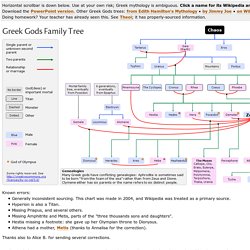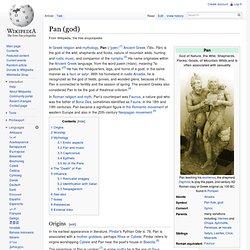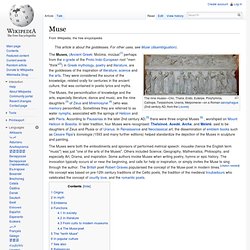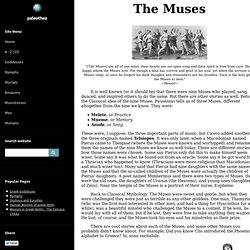

List of Greek mythological figures. Ancient Greece - Gods and Goddesses - The British Museum. Greek Gods Family Tree / Genealogy. Ludios.org.

Pan (god) In Greek religion and mythology, Pan (/ˈpæn/;[1] Ancient Greek: Πᾶν, Pān) is the god of the wild, shepherds and flocks, nature of mountain wilds, hunting and rustic music, and companion of the nymphs.[2] His name originates within the Ancient Greek language, from the word paein (πάειν), meaning "to pasture.

"[3] He has the hindquarters, legs, and horns of a goat, in the same manner as a faun or satyr. With his homeland in rustic Arcadia, he is recognized as the god of fields, groves, and wooded glens; because of this, Pan is connected to fertility and the season of spring. The ancient Greeks also considered Pan to be the god of theatrical criticism.[4] The Roman Faunus, a god of Indo-European origin, was equated with Pan.
The worship of Pan began in Arcadia which was always the principal seat of his worship. Representations of Pan on 4th century BC gold and silver Pantikapaion coins Pan is famous for his sexual powers, and is often depicted with a phallus. Christian apologists such as G.
Heros of Greek Myth. Muse. The nine muses—Clio, Thalia, Erato, Euterpe, Polyhymnia, Calliope, Terpsichore, Urania, Melpomene—on a Roman sarcophagus (2nd century AD, from the Louvre) The Muses, (Ancient Greek: Μοῦσαι, moũsai:[1] perhaps from the o-grade of the Proto-Indo-European root *men- "think"[2]) in Greek mythology, poetry and literature, are the goddesses of the inspiration of literature, science and the arts.

They were considered the source of the knowledge, related orally for centuries in the ancient culture, that was contained in poetic lyrics and myths. The Muses were both the embodiments and sponsors of performed metrical speech: mousike (hence the English term "music") was just "one of the arts of the Muses". Others included Science, Geography, Mathematics, Philosophy, and especially Art, Drama, and inspiration. Some authors invoke Muses when writing poetry, hymns or epic history. Origins[edit] Muse reading a scroll, perhaps Clio (Attic red-figure lekythos, Boeotia c. 435–425 BC) In myth[edit] O Muse! The Muses. The Muses "[The Muses] are all of one mind, their hearts are set upon song and their spirit is free from care.

He is happy whom the Muses love. For though a man has sorrow and grief in his soul, yet when the servant of the Muses sings, at once he forgets his dark thoughts and remembers not his troubles. Such is the holy gift of the Muses to men. " ~Hesiod~ It is well known (or it should be) that there were nine Muses who played, sang, danced, and inspired others to do the same. Melete, or PracticeMneme, or MemoryAeode, or SongThese were, I suppose, the three important parts of music, but Cicero added another to the three originals named Telsiopes.
Back to Classical Mythology. Muses. The Muses. Contact: .

Copyright 2000-2014, GreekMythology.comTM. For more general info on Greek Gods, Greek Goddesses, Greek Heroes, Greek Monsters and Greek Mythology Movies visit Greece.com Mythology. All information in this site is free for personal use. You can freely use it for term papers, research papers, college essays, school essays. Women in Greek Myths.